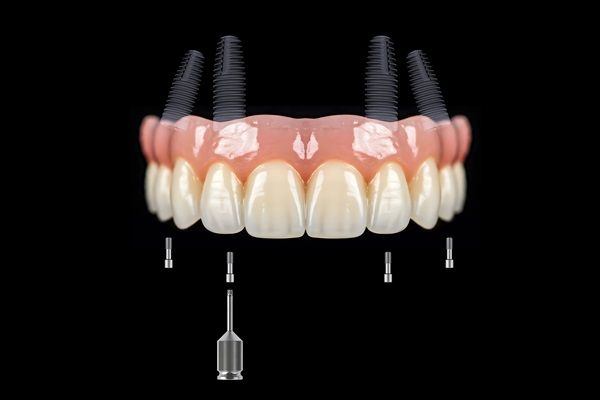4 Things to Know About Implant Supported Dentures

Learning more about your options for getting new dentures is necessary, as you need to make a choice that works for you. This requires thinking about your current lifestyle and how denture care will fit in. Denture care is very important, as when you take proper care of your dentures, they can last many years.
Types of dentures
Finding out what types of dentures are available nowadays is the first thing you need to do when getting ready to choose new dentures. When you understand the advantages and disadvantages of each choice, you are more likely to make the decision that fits your particular lifestyle. Some of the more common choices people make today include conventional dentures, partial dentures, and implant-supported dentures. Read on to learn more about implant-supported dentures, one of the more popular types of dentures people are now choosing.
Four things to know about implant-supported dentures
The list below includes four things everyone should know about implant-supported dentures.
1. They are connected to dental implants
Implant-supported dentures are held securely in place when they are connected to a few strategically placed dental implants. This means the first step for those interested in choosing dentures that are held in place using dental implants must first undergo dental implant surgery. According to the American Academy of Implant Dentistry, dental implants come in different sizes, heights, and types, making it necessary for your dental implant professional to determine which option is right for you.
2. There are two types of dentures to choose from
Implant-supported dentures are available in two types–ball–retained and bar–retained. Ball-retained dentures use ball-shaped metal attachments built into the dentures and then connected to the implants. Bar-retained dentures will connect to a thin metal bar that is attached to the implants. Clips are then attached to the bar, which the dentures connect to.
3. They stay in place and can easily be removed
Because this denture option is connected to dental implants, there is no need to worry about them moving around in one’s mouth because they always stay fixed. When someone is ready to remove the dentures from their mouth, whether it be for cleaning, maintenance, or because they are getting ready to go to bed, all one has to do is detach it from the bar or ball it is securely attached to.
4. They cannot be worn overnight
As with any denture choice, implant-supported dentures must be taken out at night. Sleeping with dentures is not recommended, as the mouth needs to rest at night. It is also necessary to thoroughly clean the dentures once they are removed from the mouth at night and then soak them in a glass of water, as this helps them to keep their shape.
Is this denture choice the right choice for you?
If you think implant-supported dentures are the right type for you, it may be time to make the leap. Book a consultation appointment so you can discuss your options and have a treatment plan set in place. Our team will discuss recommended care practices and after-care to help you maintain your dentures and upkeep your oral health throughout treatment and after. Call us today at (818) 772-6222 to learn more or schedule an appointment.
Request an appointment here: https://winnetkaplazadental.com or call Winnetka Plaza Dental at (818) 772-6222 for an appointment in our Winnetka office.
Check out what others are saying about our dental services on Yelp: Dentures and Partial Dentures in Winnetka, CA.
Related Posts
Most of us know that dentures are an option if we lose our teeth, but there is also a more permanent solution called implant supported dentures. If you’re not familiar with this type of denture, that’s ok. Recent advancements in dental technology have led to where patients can receive implants combined with other dental applications…
When it comes to health and wellness, prevention plays an integral role. In addition to making healthy lifestyle choices, practicing routine dental care is a vital step in maintaining a healthy mouth and body. There are numerous benefits for patients who commit to proper home and professional dental care.Routine dental care is necessary to maintain…
Good self-care habits ought to include time for routine dental care. From spending a few minutes each day on oral hygiene to visiting a general dentist throughout the year, taking care of the teeth and gums is an important part of personal health. Rather than leaving oral health to chance, implementing preventative dental care practices…
Daily oral hygiene habits should not be considered a substitute for the routine dental care that occurs during a dental checkup and cleaning. There are oral health concerns that a dentist will be able to proactively address during an office visit, but the equipment and tools used to care for both teeth and gums are…
